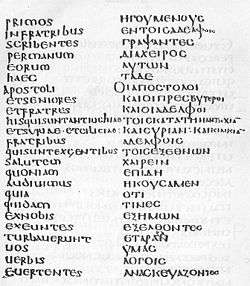Acts 7
| Acts 7 | |
|---|---|
|
Acts 15:22-24 in Latin (left column) and Greek (right column) in Codex Laudianus, written about AD 550. | |
| Book | Acts of the Apostles |
| Bible part | New Testament |
| Order in the Bible part | 5 |
| Category | Church history |
Acts 7 is the seventh chapter of the Acts of the Apostles in the New Testament of the Christian Bible. It records the address of Stephen before the Sanhedrin and his execution outside [1] Jerusalem, and introduces Saul (who later became Paul the Apostle) as 'a young man'.[2] The book containing this chapter is anonymous, but early Christian tradition uniformly affirmed that Luke composed this book as well as the Gospel of Luke.[3]
Text
The original text is written in Koine Greek and is divided into 60 verses. Some most ancient manuscripts containing this chapter are:
- Codex Vaticanus (AD 325-350)
- Codex Sinaiticus (AD 330-360)
- Codex Bezae (ca. AD 400)
- Codex Alexandrinus (ca. AD 400-440)
- Codex Ephraemi Rescriptus (ca. AD 450)
- Codex Laudianus (ca. AD 550)
- Papyrus 33 (ca. AD 550)
Structure
This chapter can be grouped:
- Acts 7:1-8 = Stephen’s Address: The Call of Abraham (Genesis 11:31-35:26)
- Acts 7:9-16 = The Patriarchs in Egypt (Genesis 37:4-49:33)
- Acts 7:17-36 =God Delivers Israel by Moses (Exodus 1:7;16:35)
- Acts 7:37-43 = Israel Rebels Against God (Deuteronomy 18:15-19; Exodus 32)
- Acts 7:44-50 = God’s True Tabernacle
- Acts 7:51-53 = Israel Resists the Holy Spirit
- Acts 7:54-60 = Stephen the Martyr
Cross references
- Acts 7:3: Genesis 12:1
- Acts 7:7: Genesis 15:14; Exodus 3:12
- Acts 7:14: Exodus 1:5
- Acts 7:28: Exodus 2:14
- Acts 7:32: Exodus 3:6,15
- Acts 7:34: Exodus 3:5,7,8,10
- Acts 7:35: Exodus 2:14
- Acts 7:37: Deuteronomy 18:15
- Acts 7:40: Exodus 32:1,23
- Acts 7:43: Amos 5:25–27
- Acts 7:50: Isaiah 66:1,2
Verse 59
The Pulpit Commentary notes Stephen's words in Acts 7:59 as a 'striking acknowledgment of the divinity of Christ: only he who gave the spirit could receive it back again':[4]
Verse 60
Alexander MacLaren noted that this verse contains 'the only narrative in the New Testament of a Christian martyrdom or death':[6]
- Then he knelt down and cried out with a loud voice, “Lord, do not charge them with this sin.” And when he had said this, he fell asleep.[7]
See also
- Abraham
- Burning Bush
- Jacob
- Joseph (son of Jacob)
- Moses
- Sanhedrin
- Saint Stephen
- Other related Bible parts: Book of Genesis, Book of Exodus, Book of Deuteronomy, Acts 6, Acts 8, Acts 21
References
- ↑ Acts 7:58
- ↑ Halley, Henry H. Halley's Bible Handbook: an abbreviated Bible commentary. 23rd edition. Zondervan Publishing House. 1962.
- ↑ Holman Illustrated Bible Handbook. Holman Bible Publishers, Nashville, Tennessee. 2012.
- ↑ Pulpit Commentary http://biblehub.com/acts/7-59.htm, accessed 14 August 2015
- ↑ Acts 7:59
- ↑ MacLaren Expositions Of Holy Scripture, http://biblehub.com/commentaries/acts/7-59.htm accessed 14 August 2015
- ↑ Acts 7:60

